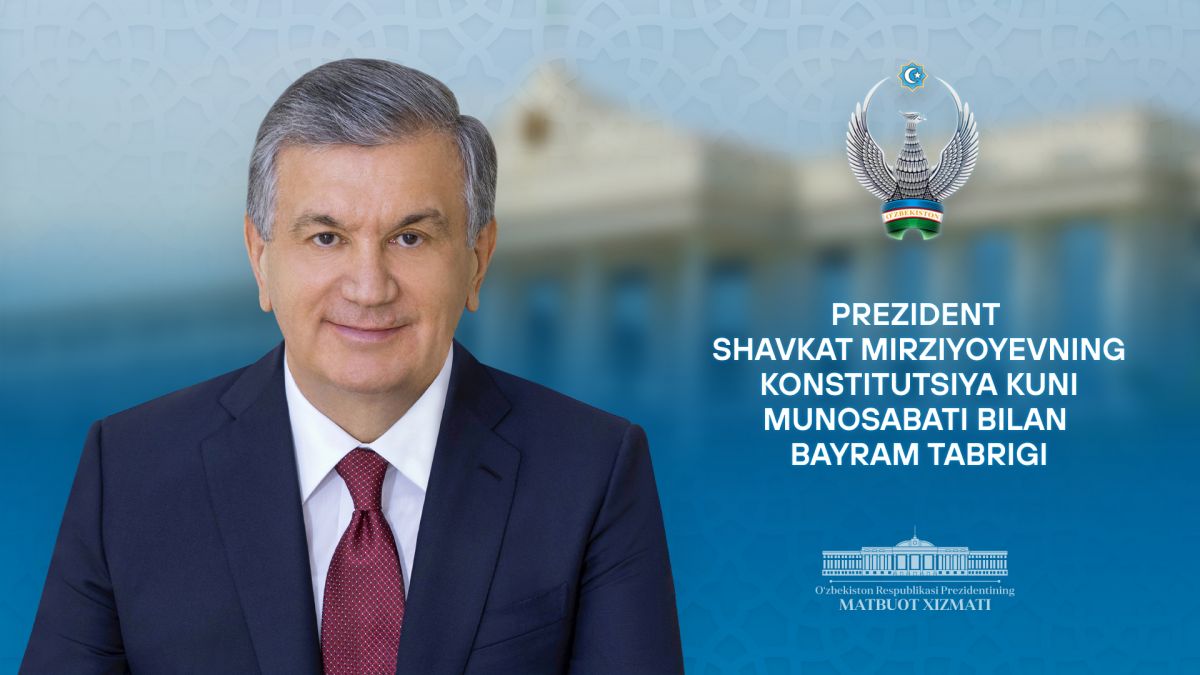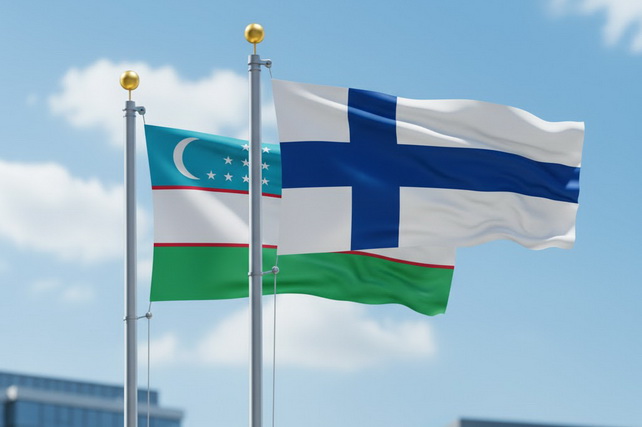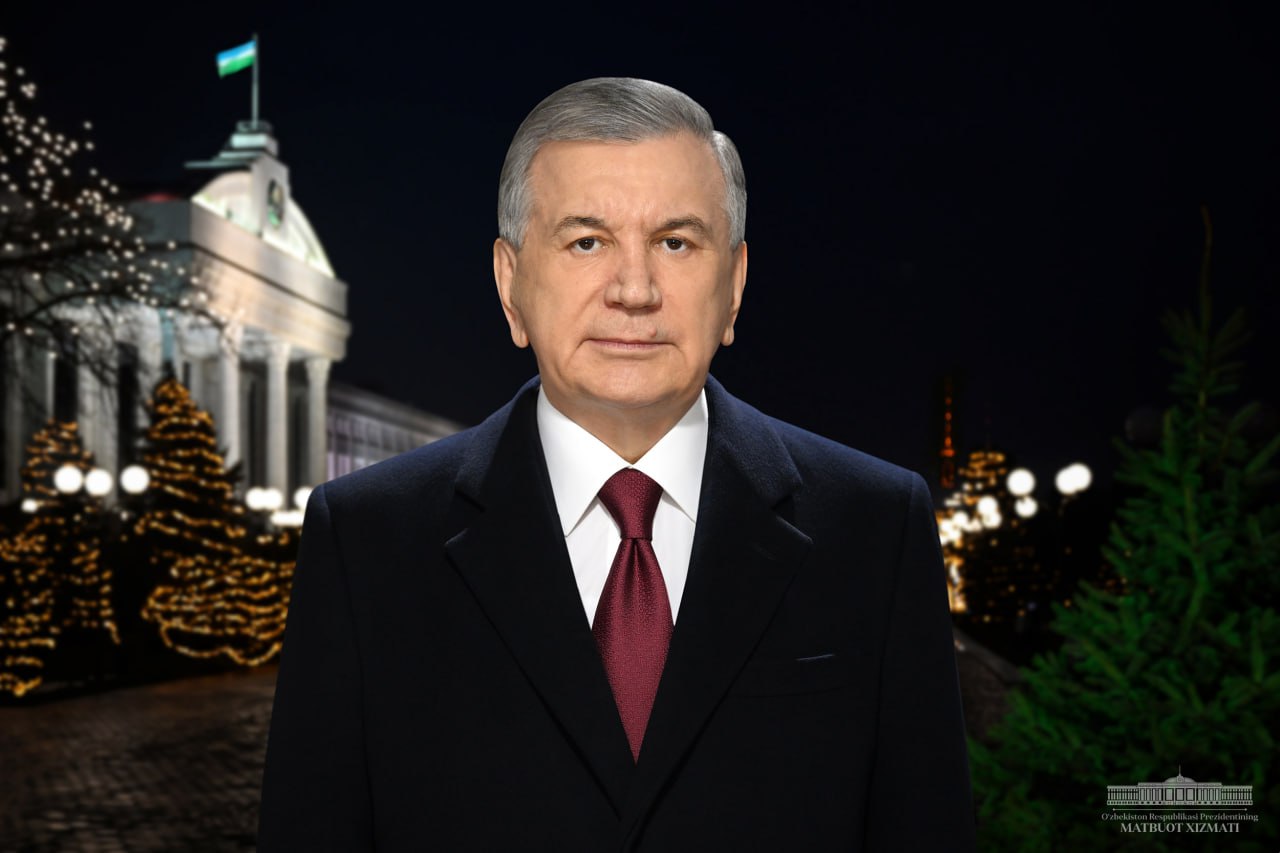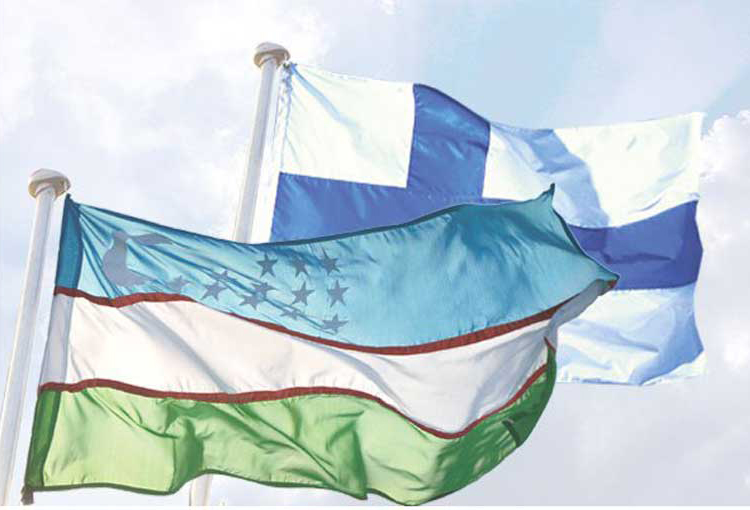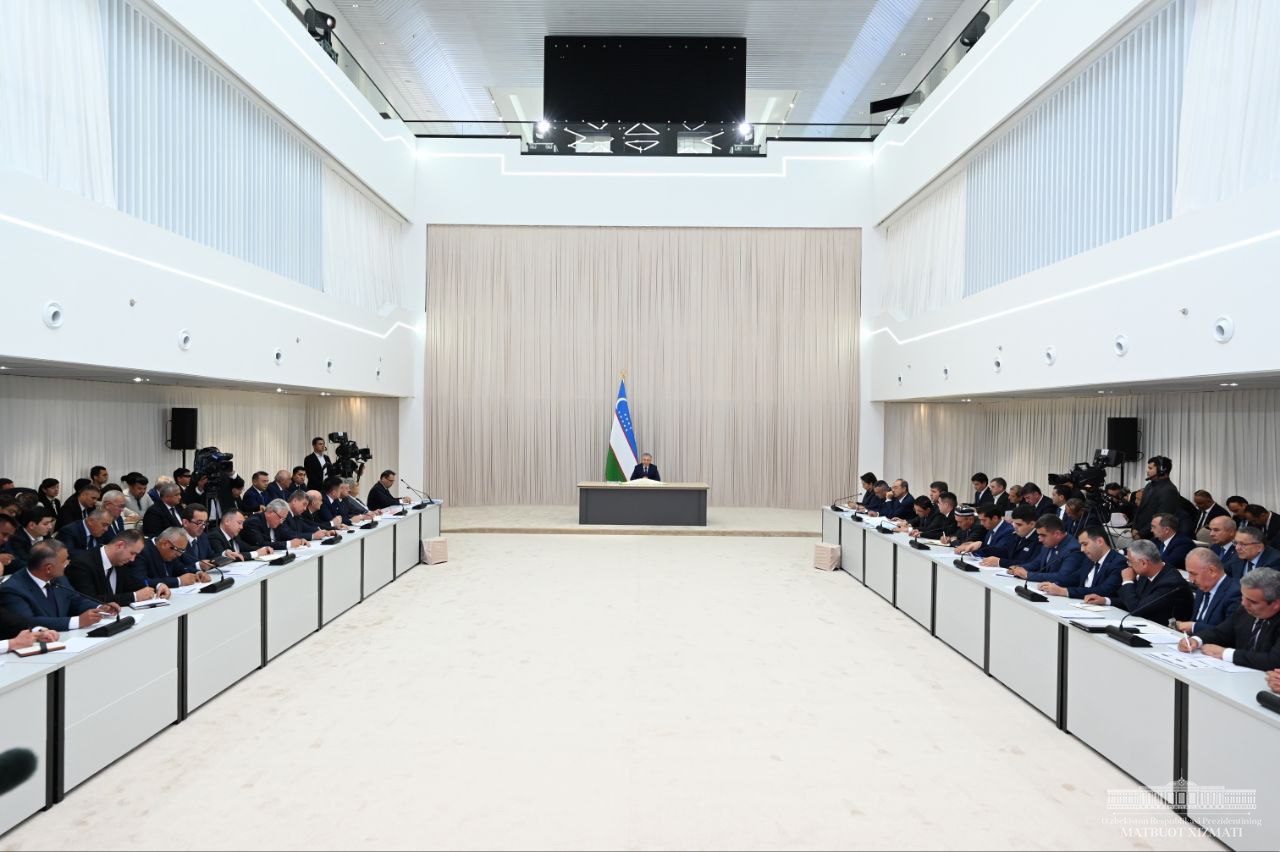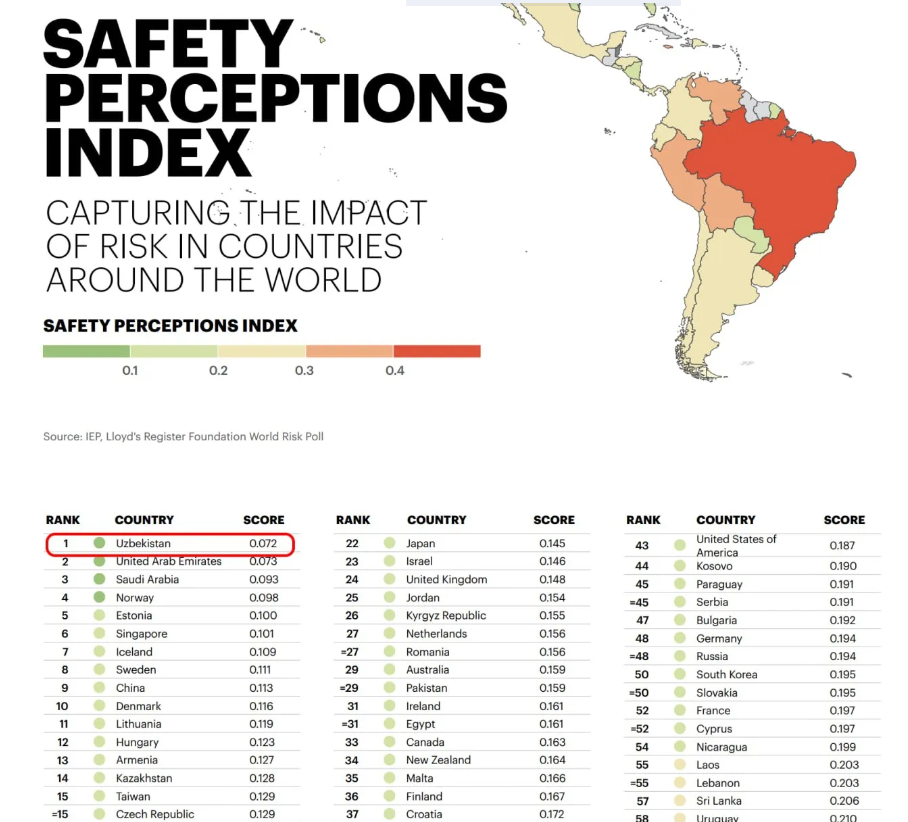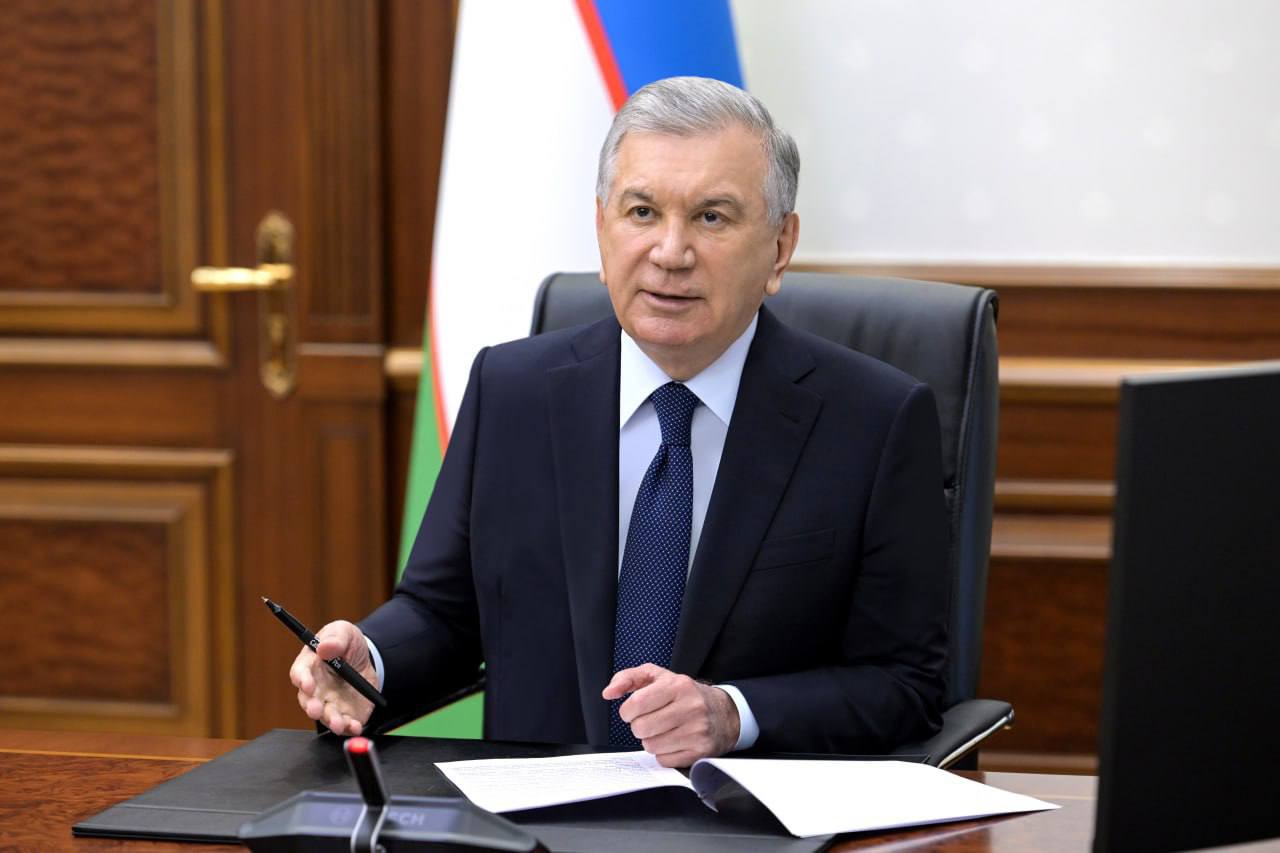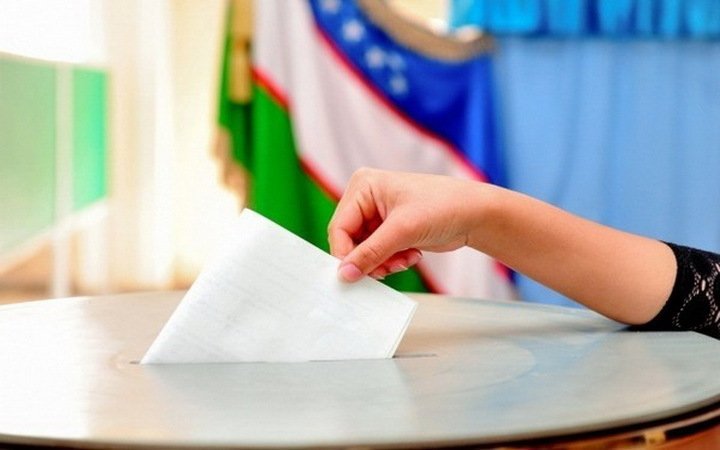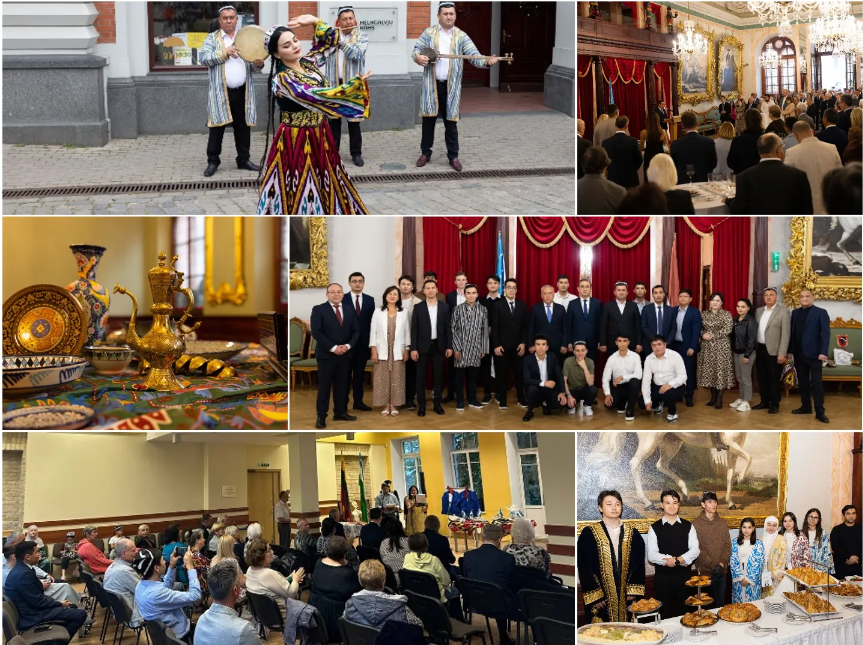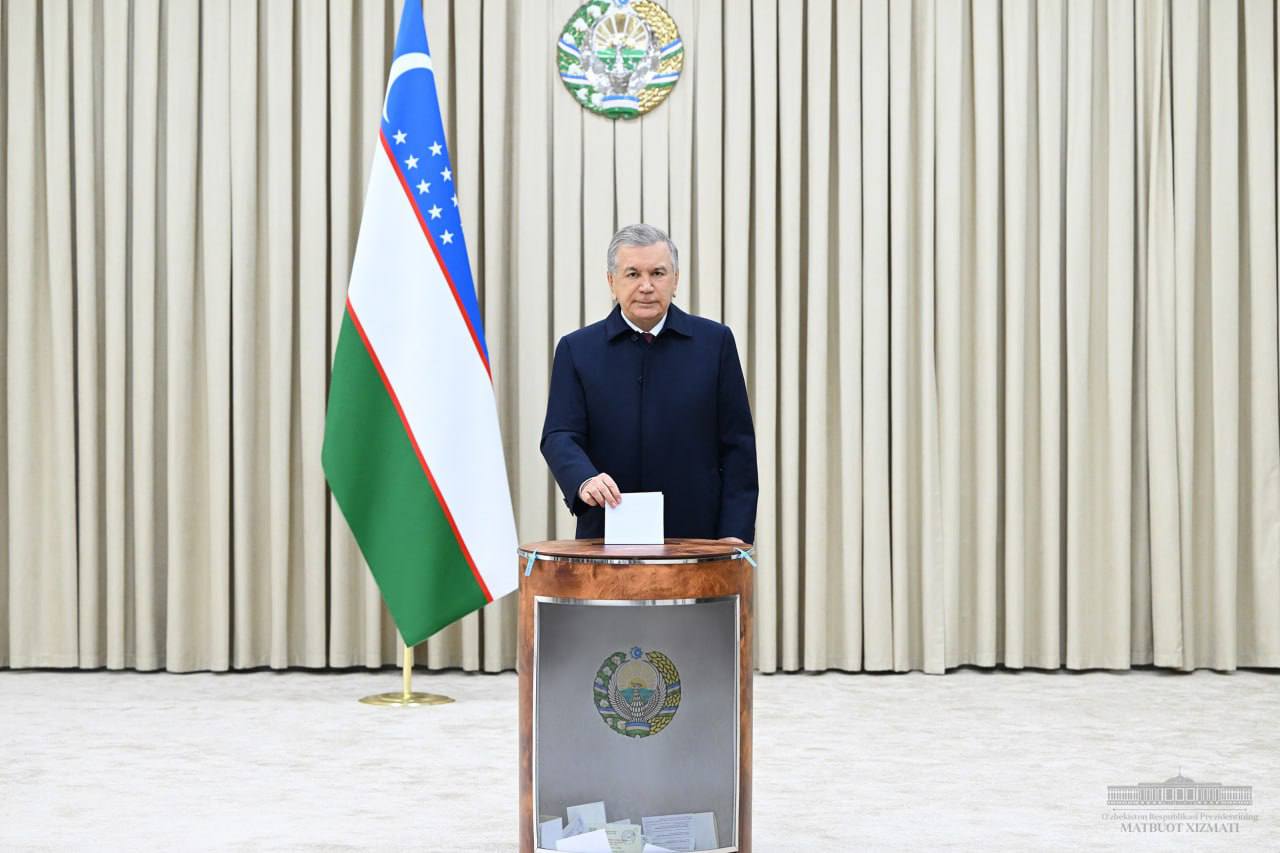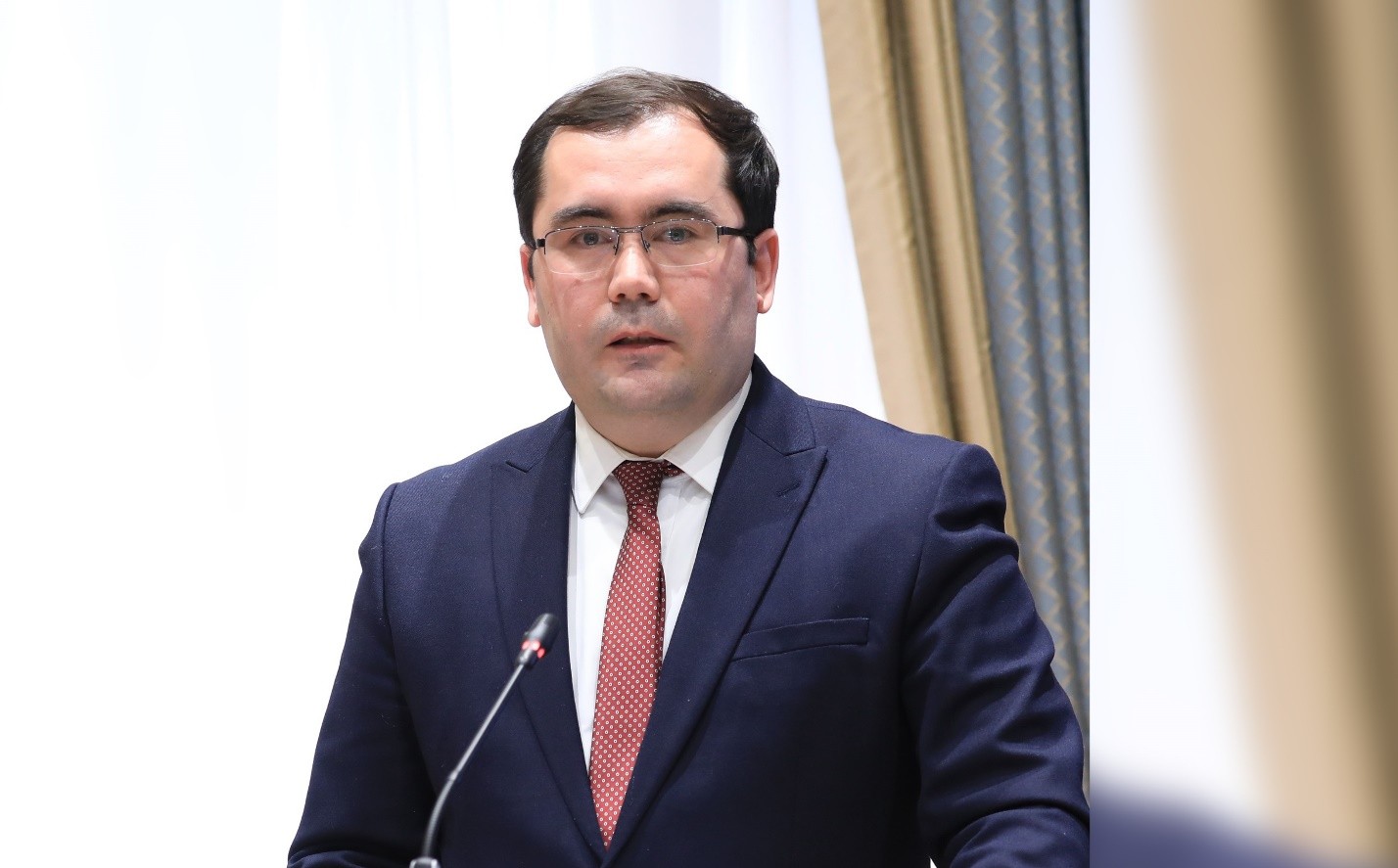Phone
Consular Issues
Phone
Uzbekistan news
We recommend
Festive greetings to the people of Uzbekistan
📅 08.12.2024
Dear compatriots!
I cordially congratulate you, all our multinational people with the Constitution Day of the Republic of Uzbekistan celebrated on December 8.
Undoubtedly, this year we all feel the significance of this holiday especially deeply. After all, above all, it takes place in the context of historic transformations in the political-legal, socio-economic and spiritual spheres of our life.
It should be emphasized once again that the elections to the Oliy Majlis and local Kengashes, held in the spirit of open and competitive contest on October 27 this year, became an important step towards the implementation of our updated Fundamental Law. As a result of the elections, which vividly demonstrated the high political culture, unity and cohesion of our hardworking and tolerant people on the path of building the New Uzbekistan, a new system of representative power has been formed in the country. Its constitutional rights and powers have been strengthened and its responsibility has increased manifold.
One more important aspect: we have moved from the practice of the recent past, when khokims were simultaneously in charge of local councils, to a new system in which, for the first time, councils are headed by chairmen elected among deputies.
The transfer of more than 30 powers of khokims to local councils testifies to an even broader establishment of the principles of democracy in our society.
In accordance with the constitutional provision that the people are the only source of state power, we will resolutely continue our reforms aimed at expanding the powers of the Parliament and local Kengashes, further increasing their activity, creating the necessary conditions for effective activity, in short, turning them into the true voice of the people.
Dear friends!
Large-scale measures are taken in the country for consistent implementation of the priority principles of ensuring human rights, interests and dignity enshrined in the Fundamental Law.
Thanks to the selfless labor of our people, in recent years the national economy has doubled, the per capita income has reached 3 thousand dollars, the poverty rate has decreased from 23 to 11 percent, the coverage of preschool education has exceeded 74 percent, higher education - 39 percent, and this is undoubtedly a historic result.
In order to dynamically continue the reforms, to apply in practice the norms of the Constitution in the new edition, the issues of entrepreneurship development and, on this basis, increasing the population's income, strengthening the atmosphere of mutual respect and harmony in families and mahallas, and comprehensive support for representatives of the older generation, women and youth will continue to be at the center of our attention.
The Fundamental Law stipulates that Uzbekistan is a social state, therefore, further improvement of cities and villages, construction of new residential buildings, health care, education, culture, art and sports institutions, modernization of road and communication networks, strengthening of targeted social protection will be of paramount importance for us. In particular, the priority task is to increase twofold the amount of funds allocated to the health sector, transition to a health insurance system and provide the population with fully guaranteed medical services.
Within the framework of programs in the field of education, we will bring the coverage of higher education to 50 percent in the coming years. In 2025 alone, 4 trillion soums will be allocated from the state budget for the repair of existing kindergartens and construction of new kindergartens and schools.
Another important area is support for those in need of social protection, for which it is planned to allocate a total of 46.5 trillion soums and lift 1 million citizens out of poverty.
We will also raise to a new level the work on creating even more favorable conditions for persons with disabilities, their socialization, and in general on ensuring inclusiveness in society. Necessary measures will also be taken to reform the pension system.
As you know, the new version of the Fundamental Law for the first time enshrines the rights of citizens in the sphere of ecology, emphasizing the state's obligations to protect the environment and maintain the ecological balance.
We have declared 2025 the Year of Environmental Protection and Green Economy in the country and have set clear objectives in this field. I am confident that this will serve as an important basis for implementing the relevant constitutional norms and principles.
I take this opportunity to urge you, dear compatriots, all our people to take an active part in the development and implementation of the State Program of the coming year.
We have no right to forget that the protection of nature is the protection of the humans, our future. We must protect our priceless wealth - fertile fields, clean springs, rivers and lakes, mountains and plains, create new gardens and parks, green territories, so that our motherland Uzbekistan becomes even more beautiful, and future generations live in a free and prosperous country.
Dear compatriots!
Our Constitution has always been and remains a reliable guarantor of strengthening national independence, preserving peace and stability in the country, interethnic friendship and harmony, ensuring the irreversibility of the ongoing reforms.
We are proud of our Fundamental Law - a vivid symbol and practical embodiment of the legal consciousness and will of the people. I believe that studying every article, every norm of this unique legal document, showing respect for them should become a sacred duty and a life principle for all of us.
I am convinced that by working in good faith, recognizing our responsibility, we will be able to further increase the effectiveness of the reforms carried out and will definitely achieve the great goals before us.
Once again I sincerely congratulate you, dear compatriots, with Constitution Day, wish you all health, peace and prosperity to your families.
May the authority and glory of our Motherland grow!
May the people of Uzbekistan - the creator of all our achievements - be happy!
Shavkat Mirziyoyev,
President of the Republic of Uzbekistan
Uzbekistan–Japan: Expanding the Boundaries of Strategic Partnership
📅 11.12.2025
In December 2025, the President of Uzbekistan Shavkat Mirziyoyev will pay an official visit to Japan and take part in the high-level Central Asia + Japan Dialogue summit.
Since the establishment of diplomatic relations between the two states on 26 January 1992, the development of Uzbek–Japanese cooperation has been one of the key priorities of Uzbekistan’s foreign policy in the Asia-Pacific region. Based on mutual respect and trust, Tashkent and Tokyo are today building dynamic, multi-tiered cooperation covering politics, security, the economy, investment, innovation, education, culture, tourism, and interaction within regional formats.
Japan has traditionally been a key strategic partner in modernizing industrial and energy infrastructure, advancing digital transformation, promoting sustainable development, and supporting progress in education, science, culture, and humanitarian exchange.
Bilateral cooperation between Uzbekistan and Japan is rich and dynamic. A turning point in the development of the dialogue was President Shavkat Mirziyoyev’s official visit to Japan in December 2019, which gave a powerful impetus to the implementation of major joint economic, investment, and humanitarian projects and defined the long-term trajectory of bilateral engagement.
On the international stage, Uzbekistan and Japan interact effectively within international organizations and support each other’s positions. Over the years, Uzbekistan has supported Japan’s candidacy to UN bodies more than 40 times, while Tokyo has co-sponsored a number of UN General Assembly resolutions initiated by Uzbekistan, including resolutions on the Central Asian Nuclear-Weapon-Free Zone, education and religious tolerance, youth support, and the role of parliaments in achieving the Sustainable Development Goals.
The strategic nature of bilateral relations is also reflected in inter-parliamentary cooperation. Friendship groups operate within both national parliaments, regular meetings of the Uzbekistan–Japan Inter-Parliamentary Forum are held, mutual visits take place, and online consultations and negotiations are conducted.
Cooperation between the foreign ministries is likewise intensive. Since 2002, 19 rounds of political consultations have been held between the foreign ministries of the two countries.
A significant milestone in this regard was the first Strategic Dialogue between the Foreign Ministers of Uzbekistan and Japan, held on 25 August 2025 in Tashkent. This new format underscored the long-term nature of bilateral engagement and the readiness of both sides to expand mutually beneficial cooperation across all areas.
Regular contacts, telephone conversations, meetings on international platforms, and reciprocal visits by foreign ministers help coordinate positions on bilateral and multilateral issues and further intensify cooperation in other areas.
Honorary consuls of Uzbekistan in Japan also play an important role in promoting interstate cooperation, actively contributing to the advancement of economic and cultural initiatives.
Economic cooperation between Uzbekistan and Japan is developing dynamically and encompasses industry, energy, communications, infrastructure, innovation, transport, and the “green economy.” Trade between the two countries is conducted under the most-favored-nation regime, which has contributed to steady growth in bilateral trade turnover.
In 2024, the Uzbek–Japanese Trade House opened in Nagoya, demonstrating Japan’s growing interest in expanding trade ties with Uzbekistan.
Joint meetings of the Uzbekistan–Japan and Japan–Uzbekistan Committees on Economic Cooperation serve as the key coordination mechanism for bilateral economic projects.
Today, 84 joint ventures with Japanese capital operate in Uzbekistan, and 13 major Japanese companies have representative offices in the country, working in the oil and gas, chemical, engineering, logistics, education, and tourism sectors.
Japanese financial institutions play a strategic role in modernizing Uzbekistan’s economy. In January 2025, a loan agreement worth USD 150 million was signed in Tashkent with the Japan International Cooperation Agency (JICA) for the construction and equipping of the Republican Center for Neurology and Stroke — a modern project that will represent an important step in advancing national healthcare.
The cultural and humanitarian dimension of Uzbek–Japanese relations is distinguished by depth and emotional resonance. For more than two decades, the Uzbekistan–Japan Friendship Society, as well as the Fukushima–Uzbekistan Association and the Japan–Uzbekistan Association, have been actively operating. The Hiroshima Peace Stone installed in Tashkent and the Japanese Garden in the heart of the capital have become symbols of strong friendship between the peoples of Uzbekistan and Japan.
Uzbekistan regularly hosts Japanese cultural festivals, film screenings, performances, and exhibitions. In turn, Uzbekistan widely showcases its cultural traditions in Japan — from national cuisine and traditional garments to music and dance. Such exchanges form a unique basis for friendship between the two nations, fostering mutual respect and strengthening long-term cooperation.
Modern cultural projects have become the hallmark of humanitarian dialogue. In April 2022, Tokyo hosted the vibrant event “Spirit of the Silk Road — Bridge of Friendship,” and in 2024, the Japanese ensemble “Japanese Pearl” won third place at the traditional Boysun Bahori festival.
Education is one of the most rapidly developing areas of humanitarian cooperation. More than 2,500 students study Japanese language across seven universities in Uzbekistan. The Uzbek–Japanese Center for Human Resource Development operates in the country, the Japan Development Scholarship (JDS) program is being implemented, and joint projects are carried out with the universities of Tokyo, Nagoya, Tsukuba, Keio, and Toyohashi. Over 400 Uzbek students have received JDS scholarships, and about 2,500 specialists have undertaken internships in Japan. Exchange programs and faculty visits are active, and university rector forums are held.
Joint scientific research is being conducted in ancient history, archaeology, oriental studies, agriculture, and climate processes.
Japan provides financial and technical support to the development of healthcare in Uzbekistan. More than USD 60 million has been allocated for equipping medical facilities, training specialists, and supplying vaccines. Over 100 Japanese volunteers have worked in Uzbekistan, and more than 200 Uzbek medical professionals have completed internships in Japan.
Interregional diplomacy occupies an increasingly important place in bilateral relations. Sister-city partnerships have been established between Rishtan and Maizuru, Tashkent and Nagoya, and Samarkand Region and Nara Prefecture. Within this framework, Samarkand Days are regularly held in Japan, alongside cultural events in Nagoya.
Growing interest among Japanese visitors in Uzbekistan’s culture and history is stimulating cooperation in the tourism sector. The number of Japanese visitors to Uzbekistan continues to rise, facilitated by expanded air connectivity, active promotion of cultural tourism, and improved infrastructure.
Particular interest is drawn to Uzbekistan’s Buddhist heritage sites — Kara-Tepe, Fayaz-Tepe, Dalverzin-Tepe, and the temple complexes of Termez and its surroundings. Thanks to the research of Japanese scholars, these monuments have gained international recognition and attract visitors and experts from around the world.
Another vivid example of Japanese public interest in Uzbekistan was the success of the Uzbek pavilion, “Garden of Knowledge: Laboratory of the Future Society,” at EXPO 2025 in Osaka. Uzbekistan’s national pavilion was recognized as one of the most remarkable exhibits and was awarded a Gold Medal. The world premiere of the National Symphony Orchestra of Uzbekistan’s performance “Celestial Dance,” dedicated to bilateral friendship, captivated Japanese audiences.
The Central Asia–Japan Dialogue, whose first leaders’ summit President Mirziyoyev will attend during his visit, is a format that fully aligns with Uzbekistan’s regional priorities and reflects the growing political consolidation of Central Asian states.
The initiative to establish the Dialogue was first proposed by Japan’s Foreign Minister Yoriko Kawaguchi during her visit to Tashkent on 24 August 2004. The priority goals identified at the time included ensuring peace and stability in the region, supporting reforms and social development, strengthening intra-regional ties, enhancing Central Asia’s partnership with neighboring regions and the international community, and cooperating on pressing regional and global issues.
Today, the Dialogue has evolved into a stable platform for trusted interaction and discussions on sustainable development.
To provide the format with practical substance, regular working meetings of senior officials, sectoral expert consultations, and Tokyo Intellectual Dialogues are held. In recent years, the Economic and Energy Dialogues at the ministerial level, conducted in Tokyo in 2023–2025, have become particularly significant.
Infrastructure assistance has always been one of Japan’s priorities within the Dialogue. Japanese organizations such as JICA and Japan Bank for International Cooperation (JBIC) systematically participate in modernizing transport corridors, logistics hubs, roads, engineering facilities, airports, and rail infrastructure. These projects significantly increase regional connectivity and strengthen Central Asia’s role as a key bridge between East Asia, the Middle East, and Europe.
Japan, a global leader in digitalization and automation, actively shares its expertise with the countries of the region. For Uzbekistan, this cooperation is especially important: the country is rapidly developing its IT sector, creating IT parks and technology parks, launching digital economy programs, and attracting Japanese experts for training national specialists.
Given Japan’s long-standing leadership in environmentally sustainable development and energy-efficient technologies, environmental cooperation is also a central element of the partnership.
As the most populous country in the region and a major transport and logistics hub, Uzbekistan plays a central role in shaping the agenda of the Dialogue. In recent years, Uzbekistan has contributed significantly to strengthening the practical content of cooperation by initiating new projects across various fields.
Over the past two decades, the Dialogue has proven itself as a stable and in-demand mechanism of partnership that allows the countries of the region and Japan to build systematic cooperation across a wide range of areas.
Thus, the upcoming visit of President Shavkat Mirziyoyev to Japan and his participation in the Central Asia + Japan Summit will deepen both bilateral and multilateral political dialogue, expand economic and investment cooperation, and strengthen educational and scientific ties. Undoubtedly, the active efforts of the President to expand mutually beneficial partnerships will once again confirm Uzbekistan’s commitment to regional integration and open, constructive international dialogue.
Prospects for Cooperation Between Uzbekistan and Finland in the Field of Ecology and Sustainable Development
📅 29.10.2025
Uzbekistan and Finland possess significant potential to deepen their partnership in the areas of ecology, sustainable natural resource management, and climate change mitigation. Environmental institutions of both countries actively engage through international conferences, forums, and projects supported by international organizations and development banks.
One of the most notable examples of practical cooperation is the joint project between the Agency of Hydrometeorological Service of Uzbekistan, the Ministry for Foreign Affairs of Finland and the Finnish Meteorological Institute. Valued at USD 2 million, the project aims to strengthen Uzbekistan’s hydrometeorological capacity, train specialists in modern forecasting methods for weather and natural disasters, and enhance climate services and adaptation measures to climate change.
To further expand bilateral cooperation, the Ministry of Ecology, Environmental Protection and Climate Change of Uzbekistan has identified several priority areas that could form the basis for a future Memorandum of Understanding with Finland.
One key area of collaboration could be sustainable forest management. Over 70% of Finland’s territory is covered by forests, which account for 0.5% of global timber reserves. Studying Finland’s experience in public-private partnerships in forestry and its effective mechanisms for conserving forest ecosystems could help Uzbekistan improve its own approaches to developing green zones and protecting natural territories.
Another promising area is circular economy development. Finland was among the first countries to adopt a national “roadmap” for transitioning to circular models of production and consumption. For Uzbekistan — which is currently developing a modern waste management and recycling system — learning from Finland’s sustainable production practices would be an important step toward achieving “green” growth.
Air quality management is also an area of great interest. Finland is recognized as one of the countries with the cleanest air in the world, thanks to its advanced monitoring systems and strict environmental regulations. Adopting Finnish technologies for tracking pollutants and reducing emissions could significantly improve air quality in Uzbekistan’s urban centers.
Particular attention is also given to climate action. Finland aims to achieve carbon neutrality by 2035 and its strategies for reducing emissions and adapting to climate challenges could serve as a valuable model for Uzbekistan in implementing its own climate commitments under the Paris Agreement.
An important area of focus is scientific and educational cooperation. The Ministry of Ecology of Uzbekistan is interested in establishing partnerships between Finnish universities and the Central Asian University of Environmental and Climate Change Studies (Green University). Academic exchange programs, joint research initiatives and the development of green educational technologies will contribute to training a new generation of environmental and climate specialists in the region.
Cooperation in biodiversity conservation and protected areas management is also of high importance. Finland allocates 13.3% of its territory for these purposes and plans to expand this figure to 30% by 2030. This experience holds great value for Uzbekistan, which is actively implementing a national program to expand its network of reserves and national parks.
The signing of a Memorandum of Cooperation between the Ministry of Ecology, Environmental Protection and Climate Change of the Republic of Uzbekistan and the Ministry of the Environment and Climate of Finland would be a logical step toward strengthening this partnership. Joint initiatives between the two countries will help combine innovation and scientific expertise in pursuit of a shared goal — protecting nature, enhancing climate resilience, and building a sustainable and environmentally secure future.
Anvar Tursunaliyev,
Chief specialist Department of international cooperation
and rankings of the Ministry of Ecology,
Environmental Protection and Climate Change
New Year greetings to the people of Uzbekistan
📅 01.01.2025
Dear compatriots!
I cordially congratulate you, the multinational people of Uzbekistan on the coming New Year 2025.
Despite the difficult situation in the world, the outgoing year has been prosperous for our country.
Thanks to the selfless labor, socio-political activity of our people, the idea of New Uzbekistan is becoming a reality.
The past elections to the Oliy Majlis and local councils have reaffirmed that we have entered a new stage of democratic reforms.
New high-tech industrial complexes, infrastructure and logistics networks, roads and railroads have been built in the country, business, IT and tourism spheres are developing. The incomes and quality of life of the population are increasing.
Our skillful dehkans and farmers, clusters have harvested rich crops. The whole country is being improved.
Kindergartens and schools, universities, cultural and sports facilities are being built. Thousands of our compatriots are welcoming the New Year in new homes.
Our energetic, enterprising young people are achieving success in all spheres. Their record achievements at the Olympic and Paralympic Games have opened a new page in the history of national sport.
The role and influence of civil society institutions, including the mahalla, are being strengthened. The sphere of spirituality and enlightenment is developing. Our country's initiatives of global significance are receiving broad support.
Uzbekistan's authority in the international arena as a competitive country and a reliable partner is growing.
All this has become possible thanks to sustainable development, the atmosphere of friendship and harmony in our society.
On this festive evening, I express my sincere gratitude to you, my dear ones, to all our people-creators for your conscientious labor and service to the Motherland.
Dear friends!
We have declared 2025 the Year of Environmental Protection and Green Economy.
Our main goal is to create a sustainable balance between the economic system and our environment. We will create even greater business opportunities.
We will resolutely continue to work to ensure the inviolability of private property and actively attract foreign investment.
The focus will be on the social sphere, increasing wages, pensions, scholarships and benefits.
We will mobilize all forces and opportunities to bring up our children harmoniously developed, with modern knowledge and professions.
We will increase attention to the development of science, education, health care, culture, art and sports.
We will continue to prioritize the care of veterans, women and youth, as well as improving the effectiveness of social protection.
We will raise to a new level the work on strengthening the potential of our Armed Forces, support for servicemen and their families.
In a word, all together, united, we will act to realize the main principle - “In the name of man, in the name of his happiness!”.
Dear friends!
Once again, I sincerely congratulate you - our compatriots abroad, as well as partners and friends of Uzbekistan around the world - on this wonderful holiday.
I wish you health, happiness, prosperity and well-being to every family, to our beloved Motherland!
May all our good dreams and hopes come true!
May our native Uzbekistan prosper!
Happy New Year to you, my dear ones!
Shavkat Mirziyoyev,
President of the Republic of Uzbekistan
Uzbekistan and Finland: An Economic Partnership Built on Technology and Trust
📅 06.11.2025
Historical Background
The history of Uzbek - Finnish relations dates back to the early 1990s, when Finland became one of the first countries to recognize the independence of the Republic of Uzbekistan - on 30 December 1991. Just two months later, on 26 February 1992, diplomatic relations were officially established, marking the beginning of a new chapter based on mutual respect, trust, and a shared commitment to technological progress.
The first high-level visits in 1992 laid the foundation for political dialogue. During that year, Uzbekistan took part in the signing ceremonies of the OSCE Helsinki Final Act and the Paris Charter. In October of the same year, Finnish President Mauno Koivisto paid an official visit to Tashkent, further consolidating the partnership. Since then, cooperation between the two countries has developed steadily across political and economic spheres.
Legal and Institutional Framework
Today, the legal framework governing Uzbek-Finnish relations comprises eight active documents, including two interstate and six intergovernmental agreements. These include the 1992 Agreements on Mutual Protection of Investments and on Trade, Economic, and Technological Cooperation, as well as treaties on air and road transport (1996 and 1997) and agreements on avoiding double taxation and on customs cooperation.
New initiatives reflecting the modern stage of partnership are under consideration - such as a draft agreement on visa exemption for holders of diplomatic passports, a memorandum on cooperation in environmental protection, and a protocol on consultations between the foreign ministries.
Cooperation Priorities: Technology, Ecology, and Innovation
Finland, recognized globally as a leader in innovation, sustainable development, and green technologies, serves as a valuable model for Uzbekistan in its transition toward a digital and energy-efficient economy.
In 2017, a business delegation of nine Finnish companies specializing in engineering, agribusiness, telecommunications, and logistics visited Uzbekistan to participate in the AgroWorld Uzbekistan international exhibition. This visit gave new impetus to direct business-to-business engagement.
In April 2019, Tashkent hosted a delegation led by Mikko Koiranen, Deputy State Secretary of Finland for Foreign Economic Relations. The delegation included 29 representatives from leading companies and organizations - such as Nokia Siemens Networks, ABB, Wärtsilä, Uponor Infra, Tikkurila, ISKU, and Airbus Defense and Space. Discussions focused on implementing Finnish technologies in Uzbekistan, joint energy and raw material processing projects, and opportunities in smart cities and water management.
Later, in November 2019, Antti Koskelainen from the Finnish export credit agency Finnvera visited Tashkent, marking an important step toward deeper financial and investment cooperation. Meetings with the Ministry of Investment, Industry and Trade, the Ministry of Finance, and the Agency for State Asset Management addressed mechanisms for crediting and insuring Finnish export operations in Uzbekistan.
Trade: A Threefold Growth in One Year
Economic cooperation between Uzbekistan and Finland continues to expand. The two countries enjoy Most-Favored-Nation trade status, and regular meetings of the Joint Intergovernmental Commission on Trade, Economic, and Scientific-Technical Cooperation (five sessions to date, the latest held in Tashkent in February 2023) ensure a dynamic dialogue.
Trade turnover has shown remarkable growth in recent years: from USD 48.45 million in 2020 to USD 151.7 million in 2024 - an increase of over threefold. This upward trend reflects intensified business ties and growing interest among Finnish companies in the Uzbek market.
Investment and Business Cooperation
Finland is viewed in Uzbekistan not only as a trading partner but also as a source of innovation and investment. Currently, 14 enterprises with Finnish capital operate in Uzbekistan - four joint ventures and ten with 100% foreign ownership - active in sectors such as electronics, software, energy, agriculture, food processing, chemicals, and telecommunications equipment.
Finnish businesses are showing strong interest in renewable energy, waste recycling, eco-construction, water management, and sustainable agriculture. Uzbekistan, in turn, offers attractive conditions for investors - tax incentives, developed industrial infrastructure, and access to a 75-million-strong Central Asian market.
Finland’s Economic Potential: Opportunities for Partnership
Finland is one of Europe’s most advanced and innovative economies, known for its high living standards, sound macroeconomics, and strong industrial base. In 2024, its GDP exceeded USD 320 billion, with GDP per capita around USD 58,000. The economy is well-balanced, with services accounting for over 70%, industry 27%, and agriculture 2.5%. Inflation remains one of the lowest in Europe - around 3% - ensuring a stable and predictable business environment.
For Uzbekistan, cooperation with Finland opens wide-ranging opportunities for industrial, investment, and technological partnership, including:
- Energy: joint projects in renewable energy, smart grids, and energy storage; development of solar panel and wind equipment manufacturing.
- Water and Environment: Finnish expertise in water purification, waste processing, and efficient water management, particularly relevant for agriculture and urban infrastructure.
- Engineering and Electronics: creation of joint ventures in industrial equipment, automation systems, and telecommunications.
- Construction and Green Materials: Finnish participation in energy-efficient building projects, production of eco-friendly insulation and finishing materials, and smart home systems.
- Education and Science: joint engineering and IT education programs, establishment of research laboratories, and introduction of dual education models based on Finnish experience.
- Agro-Industry: cooperation in precision farming, agricultural digitalization, and production of eco-friendly export-oriented goods.
Finland’s experience in sustainable development and digital transformation makes it a strategic partner for Uzbekistan’s “green economy” agenda and industrial modernization. At the same time, Uzbekistan - with its abundant natural resources, young workforce, and expanding domestic market - offers Finnish companies favorable conditions for localization and regional expansion.
A Look Ahead
The partnership between Uzbekistan and Finland goes beyond traditional economic cooperation. It stands as an example of how innovation and sustainability can form the foundation of long-term, mutually beneficial relations. Joint projects in digitalization, green energy, and education are paving new avenues for the exchange of expertise, technologies, and investments.
Finland regards Uzbekistan as a reliable partner in Central Asia, while Uzbekistan views Finland as a strategic ally in advancing its “smart growth” model and building a knowledge-based economy.
The synergy between Finland’s pragmatic northern experience and Uzbekistan’s dynamic eastern development creates a powerful foundation for further strengthening bilateral relations - grounded in trust, innovation, and mutual respect.
Dialogue on the development of engineering science and education was held
📅 20.06.2024
On June 20, President Shavkat Mirziyoyev chaired a video conference call on training engineering personnel and improving the performance of higher educational institutions.
In today's competitive world, our country, relying on domestic resources, is moving towards industrial development. Every year 3 thousand industrial enterprises are put into operation, about 150 thousand jobs are created.
This year, projects worth 21 trillion soums will be implemented within the framework of state investment programs. Also, projects with foreign and regional investments worth 37.5 billion dollars are planned for this year.
Accordingly, the state pays great attention to science, education and innovation. For example, over the past four years, 2.2 trillion soums have been allocated to 1,727 practical, innovative, fundamental and startup projects. Spending on research and development has doubled.
However, the results in this area and the number of highly qualified engineers are still insufficient. There is a gap between higher education institutions and industry.
That is why rectors of technical universities were also invited to the meeting.
The head of state first of all dwelt on the problems in this sphere.
The 36 state technical higher educational institutions annually graduate 67 thousand specialists. However, the programs and specialties in these universities do not meet the requirements of manufacturers. As a result, 60 percent of engineers do not work in their specialty.
Higher educational institutions are limited to fundamental research, and practical developments for the economy are very rare. Hundreds of startups and innovative projects in engineering fields remain on paper.
In foreign universities there are such specialties as "value engineering", "comparative engineering", "reverse engineering". In our technical universities, these areas are not developed. As a result, industries have to spend a lot of money on training their employees abroad or attract specialists from abroad.
Although the coverage of higher education has increased 5 times in the last seven years, the interest of young people in engineering and technical specialties is very low. Some equipment of universities and scientific laboratories is outdated. Many professors and teachers are disconnected from practice. Rectors do not visit enterprises, do not familiarize themselves with new technologies, do not study equipment and machines.
Over the last four years, the number of research contracts of universities has tripled. Revenues from them have increased 6 times. However, the implementation of the results of scientific developments into production is slow. Not everyone is equally successful in patenting their inventions.
The President presented new initiatives to develop this area.
Now training and research processes in technical areas will be completely changed based on the best practices. 36 universities and their branches will be gradually consolidated, leaving a total of 20 technical universities. They will completely switch to the dual system of education.
Specialties that are not in demand in the labor market will be reduced. Some departments will be merged. The functions of dean offices to serve students will be digitalized. Based on foreign experience, a "Registrar's Office" will be created.
Each university will establish cooperation with prestigious technical universities of developed partner countries such as Germany, Japan, China, Russia, Italy, Turkey, South Korea, Singapore.
Based on the chain "industry-enterprise-university", each university will be assigned an industrial partner.
All engineering universities will open departments at their partner enterprises and introduce dual education. At the same time, the enterprises will allocate funds to equip the departments, stimulate teachers and students. Student internships and graduate training will be fully organized at partner enterprises.
Thirty-two sectoral councils will be established in the system of ministries and enterprises. They will determine priority directions of scientific research in technical fields together with institutes and will be customers of these researches.
Also at the first stage, higher engineering schools will be opened in 10 universities. Two-year applied master's degree programs will be implemented in them, and candidates will be selected by order of manufacturers. Enterprises will financially support the establishment and equipping of laboratories in higher engineering schools. The state will also provide highly qualified engineers-technologists. If every minister, industry leader, rector, professor and teacher feels deep sense of responsibility and works hard, we will definitely achieve this," Shavkat Mirziyoyev said.
The status of pilot production enterprises of universities will be legislated. They will be granted privileges applicable to IT park residents. At least 60 percent of the employees of the subsidiaries will be doctoral candidates and students.
From next year, state grants for projects in technical areas will be increased fourfold. Partner organizations of universities will also be allowed to act as founders of enterprises.
Hokims of regions and heads of industries will be able to directly provide universities with orders for scientific and production projects up to 10 billion soums.
A system of allocating at least half a percent of the cost of investment projects for scientific activities will be introduced.
It has been determined to organize national contests "Best Idea", "Best Project" and "Best Invention" in engineering fields. Teachers, students and practicing engineers will be able to participate in them. The prize for the first place is an electric car.
Also 10 best participants, authors of ideas, projects and inventions will be sent for internship to such countries as Germany, Japan, China, Russia, Italy, Turkey, South Korea, Singapore.
The meeting continued in the format of an open dialog. Industry leaders, scientists, rectors and engineers expressed their opinions on the development of science and education in engineering.
It was assigned to draft a relevant decree based on the proposals.
- We need highly qualified engineers-technologists like air for the accelerated development of the economy. If every minister, industry leader, rector, professor and teacher feels deep sense of responsibility and works hard, we will definitely achieve this," Shavkat Mirziyoyev said.
Uzbekistan recognized as the safest of 121 countries worldwide
📅 29.07.2024
TASHKENT, July 28. /Dunyo IA/. Uzbekistan took 1st place in the ranking of the safest countries in the world "Safety Perception Index 2023", which includes 121 countries, reports Dunyo IA correspondent.
According to Uzbektourism, the rating indicates that the level of danger to the life and movement of citizens in Uzbekistan is minimal.
The five safest countries also included the United Arab Emirates, Saudi Arabia, Norway and Estonia.
Of the Central Asian countries, Kazakhstan took 14th place, Tajikistan – 17th, Kyrgyzstan – 26th.
Guinea, Sierra Leone and Mali took the lowest place in the rating.
The "Safety Perception Index" focuses on five factors: food and water, violent crime, adverse weather conditions, mental health and safety in work settings. These factors serve as an important basis for the formation of an image that will become the basis for the security rating of countries.
The fact that Uzbekistan is in first place in this ranking creates the basis for the unhindered arrival and departure of foreign tourists to our country.
New approaches in poverty reduction presented
📅 18.01.2025
President Shavkat Mirziyoyev reviewed a presentation on measures for ensuring population’s employment and poverty reduction based on new approaches.
This year it’s planned to ensure employment of 5.2 million citizens and bring out of poverty 1.5 million people. For the first time 60 districts and cities will become territories free of poverty and unemployment.
Jointly with mahalla bankers it’s planned to ensure constant employment for 1.5 million people and attract more than 2 million citizens to businesses. For this purpose it’s planned to allocate a total of 120 trillion soum of credit resources for small business projects.
Based on best foreign practices, new approaches to poverty reduction will be introduced in 32 areas. In particular, solar power plants with a total capacity of 107 megawatts will be built in 300 complex mahallas, and members of low-income families will be hired to operate them on a cooperative basis.
In 123 districts, low-income citizens will be offered work on the creation of forest and nursery lands on 20 thousand hectares, as well as the cultivation of medicinal plants. They will be paid a subsidy of 375 thousand soums for every 100 trees planted.
In places with tourism potential it is planned to open guest houses and catering outlets, and at a number of post offices - e-commerce centers, where representatives of low-income families will also get jobs.
A total of 6.472 mahallas in 2025 will implement projects based on new approaches, which will help lift 210 thousand people out of poverty.
Special attention will be paid to remote villages with particularly difficult conditions. In them, the Association of Mahallas of Uzbekistan will take measures to foster a spirit of entrepreneurship, reduce dependency and support labor activity of low-income families.
The Head of State reiterated that 2025 will be decisive in reducing unemployment and poverty, and gave instructions to ensure a systematic and targeted approach to the implementation of the presented measures.
The Ministry of Employment and Poverty Reduction is tasked with strictly monitoring the implementation of these tasks. Each initiative and each activity will be entered into an electronic platform with subsequent verification of the created jobs on the tax base.
The importance of organizing training for the staff of local khokimiyats and “ mahalla seven”, as well as promotion of best practices was also noted.
Autumn elections to the Parliament of Uzbekistan will be held on the basis of a new system
📅 30.07.2024The text of the article is in Russian!
Latvia and Lithuania held festive events in honor of the 33rd anniversary of our country's independence
📅 15.09.2024The text of the article is in Uzbek!
President Shavkat Mirziyoyev votes in elections
📅 27.10.2024
Today, elections to the Legislative Chamber of Oliy Majlis and kengashes of people's deputies are being held in our country.
President of the Republic of Uzbekistan Shavkat Mirziyoyev together with his family members visited polling station No. 59 in Mirzo-Ulugbek district of the capital and took part in the voting.
Article 128 of the Constitution of our country states that citizens have the right to elect and be elected to the representative bodies of state power. The right to vote, equality and freedom of expression are guaranteed by law.
Five parties are running in the elections: the Movement of Entrepreneurs and Business People - Liberal Democratic Party of Uzbekistan, the Milliy Tiklanish Democratic Party, the Ecological Party, the People's Democratic Party and the Adolat Social Democratic Party.
This important event is taking place in the context of increased social and political activity in our country, under the slogan “My Choice - Prosperous Motherland”.
For the first time in the history of Uzbekistan, elections to the Legislative Chamber of the Oliy Majlis are held on the basis of a majoritarian-proportional, that is, mixed electoral system. 75 deputies are elected directly under the majoritarian system, i.e. by voting for their preferred candidates, and the remaining 75 - under the proportional system, when votes are cast for political parties.
Over the past period, the electoral legislation has been radically improved in line with advanced democratic standards. In particular, a new system of electoral bodies headed by the Central Electoral Commission had been introduced, and, in order to enhance the role of women in society, it had been established that the proportion of women among political party candidates should be at least 40 per cent.
Another notable aspect of the current elections was that the interaction between the participants in the process had been fully digitalized through the E-Saylov information system.
This information system has raised the openness of the elections to a higher level.
All polling stations have created conditions for voters in accordance with the law. There are 5,770 district and 11,028 precinct election commissions organized in the field, including 57 polling stations in 40 foreign countries.
More than 850 foreign and international observers from the CIS, SCO, Organization of Turkic States, as well as a full-scale mission of the OSCE Office for Democratic Institutions and Human Rights are taking part in monitoring the election process.
The head of state talked to citizens who came to the polling station. He thanked them for their active participation in the elections with a sense of involvement in the fate of their native country and their district.
A New Chapter in Uzbekistan–EU Relations: Why the EPCA Matters
📅 06.11.2025
On 24 October 2025, Uzbekistan and the European Union signed the Enhanced Partnership and Cooperation Agreement (EPCA) — a comprehensive framework that culminates negotiations launched in February 2019 and initialled in July 2022. More than a ceremonial milestone, the EPCA codifies a strategic upgrade in our relationship with the EU. It is broad in scope — nine titles, 356 articles, and 14 annexes — and practical in ambition: to align our cooperation with the realities of a rapidly changing world economy while reinforcing the rule-of-law foundations of sustainable development at home.
The agreement’s timing is revealing. Uzbekistan’s recent balanced, multi-vector foreign policy and people-centred reforms — strengthening the rule of law, expanding public administration openness, and advancing market reforms — have laid the necessary groundwork. These steps in human rights and governance have increased international confidence, enabling a rules-based partnership with Europe. The EPCA is both a vote of confidence in Uzbekistan’s reform trajectory and a tangible roadmap to deliver measurable outcomes.
Economically, the EPCA offers a clear pathway for integration and growth. It promotes approximation to EU norms on technical regulations, product safety, and sanitary and phytosanitary measures. The agreement is designed to reduce non-tariff barriers, simplify border procedures, and make our exporters more competitive in the EU market. It encourages joint ventures and industrial clustering, extends agro-processing and manufacturing value chains, and supports energy efficiency and industrial modernisation. In short: more trade, more investment, and more quality jobs at home.
Human capital is an equally central pillar. The EPCA expands cooperation across education, science, skills development, and public health. It encourages joint university programmes, faculty and student exchanges, and research grants — mechanisms that accelerate knowledge transfer and help align our skills base with the demands of a digital and green economy. The spillovers are immediate and tangible: better public services, higher productivity, and new career pathways for our young people.
The rule-of-law dimension is another strategic gain. Deeper cooperation on judicial reform, anti-corruption, data protection, and cybersecurity increases predictability for investors and protections for citizens. The agreement’s chapter on foreign and security policy expands dialogue on conflict prevention, crisis management, non-proliferation, and export controls. This cooperation supports regional stability, which is essential for long-term growth.
Connectivity is the backbone that makes these ambitions feasible. Through synergies with the EU’s Global Gateway initiative and the Trans-Caspian Transport Corridor, the EPCA supports logistics hubs, border modernisation, and greener infrastructure. Better connectivity means lower trade costs, faster delivery times, and diversified export routes — practical levers for competitiveness. It also enables cooperation on water management, climate adaptation, and resilient energy systems — strategic priorities for a land-linked Central Asian economy.
Critically, the EPCA opens structured avenues for collaboration on critical raw materials needed for the green and digital transitions. This builds on the EU-Uzbekistan memorandum of understanding signed in 2024. It creates opportunities to upgrade domestic standards, attract responsible investment, and join higher segments of global value chains, while maintaining environmental and social safeguards.
Beyond the text, the joint statement issued at the signing underscores a shared commitment to the UN Charter and to the principles of independence, sovereignty, and territorial integrity — principles that guide our positions in international fora. It also welcomes the outcomes of the EU–Central Asia Summit, including plans for a Central Asia–EU Economic Forum and a Trans-Caspian Connectivity Investors Forum in Tashkent in 2025. In short, the EPCA is embedded in a wider, forward-looking regional agenda.
In practical terms, success requires implementation of three clear priorities: coordinated institution building, enhanced business support, and transparent, data-driven tracking. These will ensure commitments translate to outcomes.
First, institutional coordination. Translating commitments into outcomes requires a whole-of-government mechanism with clear mandates, timelines, and dashboards. A national EPCA coordination council, supported by technical working groups, should steer approximation to EU standards, monitor progress, and troubleshoot bottlenecks.
Second, business enablement. Firms need guidance to navigate new standards and opportunities. An 'EU Helpdesk' for exporters and investors would offer practical advice on certification, rules of origin, and compliance. This would turn legal text into business practice. Expanding the capacity of testing, inspection, and certification bodies will further reduce transaction costs and speed market entry.
Third, open, data-driven delivery. Customs and trade facilitation should be fully digitised through single-window systems and interoperable data exchange. Regular public reporting on milestones — such as education partnerships, financed projects, and adopted standards — will sustain credibility and invite feedback from business and civil society.
The EPCA also aligns with Uzbekistan’s WTO accession path by encouraging market-based reforms and transparent, rules-based trade. As reforms deepen, our economy will see more diversified exports, stronger investor protections, and a more competitive domestic market. These outcomes raise household incomes and expand opportunity.
This agreement is ambitious by design. Ambition alone is empty; execution alone is stagnant. The EPCA combines both — setting a high bar and supplying the means to reach it. By acting decisively, we turn this framework into a catalyst for inclusive growth, institutional maturity, and global credibility.
Ultimately, the EPCA is more than a diplomatic success; it is the engine for Uzbekistan’s reform agenda. By linking citizen welfare, business competitiveness, and international engagement, the EPCA puts us on a path to fundamental transformation. The critical task ahead is to deliver on this promise and make the Uzbekistan-EU partnership impactful and enduring.
By Eldor Tulyakov,
Executive Director, Development Strategy Centre, Uzbekistan

